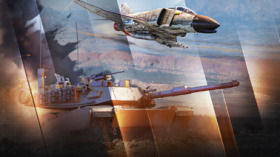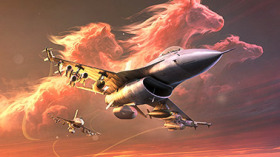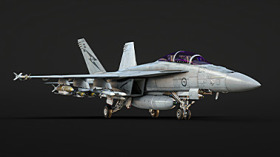
- For PC
- For MAC
- For Linux
- OS: Windows 10 (64 bit)
- Processor: Dual-Core 2.2 GHz
- Memory: 4GB
- Video Card: DirectX 11 level video card: AMD Radeon 77XX / NVIDIA GeForce GTX 660. The minimum supported resolution for the game is 720p.
- Network: Broadband Internet connection
- Hard Drive: 23.1 GB (Minimal client)
- OS: Windows 10/11 (64 bit)
- Processor: Intel Core i5 or Ryzen 5 3600 and better
- Memory: 16 GB and more
- Video Card: DirectX 11 level video card or higher and drivers: Nvidia GeForce 1060 and higher, Radeon RX 570 and higher
- Network: Broadband Internet connection
- Hard Drive: 75.9 GB (Full client)
- OS: Mac OS Big Sur 11.0 or newer
- Processor: Core i5, minimum 2.2GHz (Intel Xeon is not supported)
- Memory: 6 GB
- Video Card: Intel Iris Pro 5200 (Mac), or analog from AMD/Nvidia for Mac. Minimum supported resolution for the game is 720p with Metal support.
- Network: Broadband Internet connection
- Hard Drive: 22.1 GB (Minimal client)
- OS: Mac OS Big Sur 11.0 or newer
- Processor: Core i7 (Intel Xeon is not supported)
- Memory: 8 GB
- Video Card: Radeon Vega II or higher with Metal support.
- Network: Broadband Internet connection
- Hard Drive: 62.2 GB (Full client)
- OS: Most modern 64bit Linux distributions
- Processor: Dual-Core 2.4 GHz
- Memory: 4 GB
- Video Card: NVIDIA 660 with latest proprietary drivers (not older than 6 months) / similar AMD with latest proprietary drivers (not older than 6 months; the minimum supported resolution for the game is 720p) with Vulkan support.
- Network: Broadband Internet connection
- Hard Drive: 22.1 GB (Minimal client)
- OS: Ubuntu 20.04 64bit
- Processor: Intel Core i7
- Memory: 16 GB
- Video Card: NVIDIA 1060 with latest proprietary drivers (not older than 6 months) / similar AMD (Radeon RX 570) with latest proprietary drivers (not older than 6 months) with Vulkan support.
- Network: Broadband Internet connection
- Hard Drive: 62.2 GB (Full client)
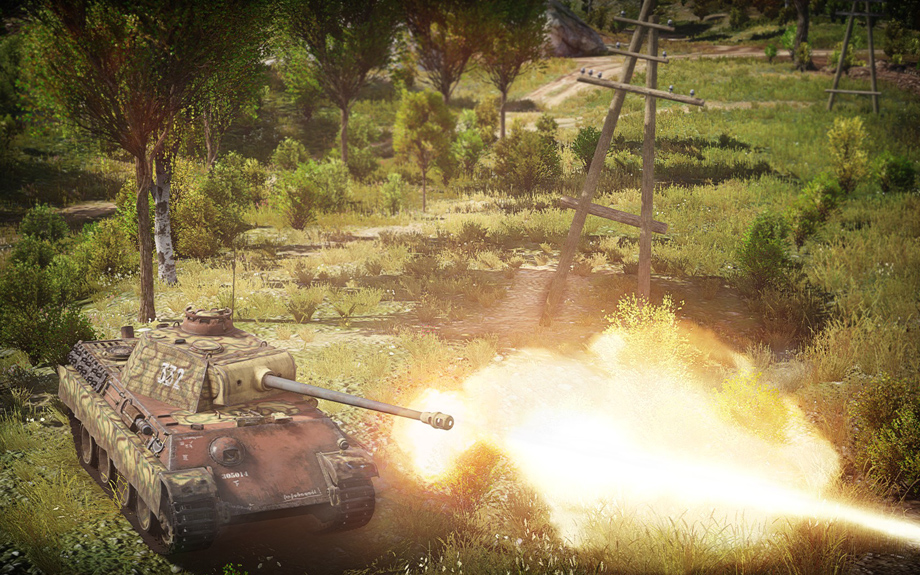
'Panther G Red Prime' skin by JoKeR_BvB09 | download here
Paul Schulze died on 28 July 1980 in the town of Brakel; the same town where he was born 67 years earlier in 1913. There is very little of his early life documented, but in 1934 he joined the rapidly swelling ranks of the German army. His first posting was to a transport battalion. By 1938, he had been promoted to Leutnant and was in command of a platoon in an anti-tank battalion. He stayed in this post through the invasion of France and Operation Barbarossa. By the start of April 1942 he was in command of a company, had been awarded his first medals and had been promoted to Hauptmann.
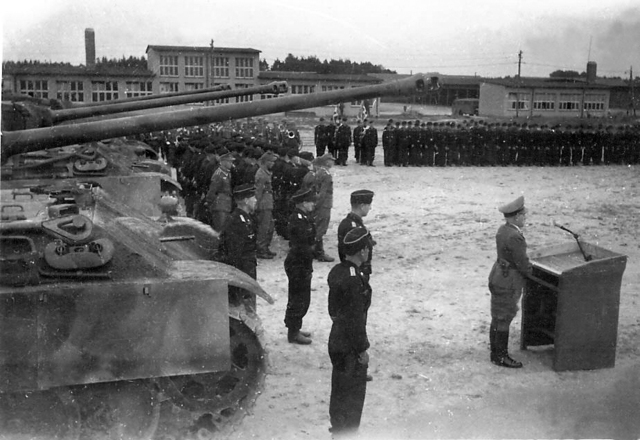 |
| Tanks and tankers at the Fallingbostel training school |
Along with his promotion to Hauptmann he was placed in command of the 2nd Battalion of the 21st Panzer Regiment. In late 1943 at Vitebsk he was awarded the Iron Cross. By early 1944 he was in command of the entire regiment and had been promoted again to Major. Later that year he was moved to command the Panzer Training school at Fallingbostel.
As the Allies began to push into Germany, any tanks available were grouped together in adhoc Kampfgruppe and thrown into combat. Major Schulze took command of the school’s five Panthers and six Tigers (commanded by Oberleutnant Fehrmann) and led them into combat against the advancing allies. The Kampfgruppe also had infantry units in Sdkfz 251 half-tracks. However, the unit started to take losses before it was even in combat when one of the Tigers broke down while moving up to the front.
The first attack on April 8th 1945 was a disaster. Four of the Panthers were destroyed by US forces with only Major Schulze's tank surviving. The following day in an assault on the British 6th Airborne Division, one of the Tigers was hit in the turret by a PIAT and its turret traverse was damaged. Covered by two other Tigers it fell back to safety. The Tigers covering the retreating tank took some 30 prisoners.
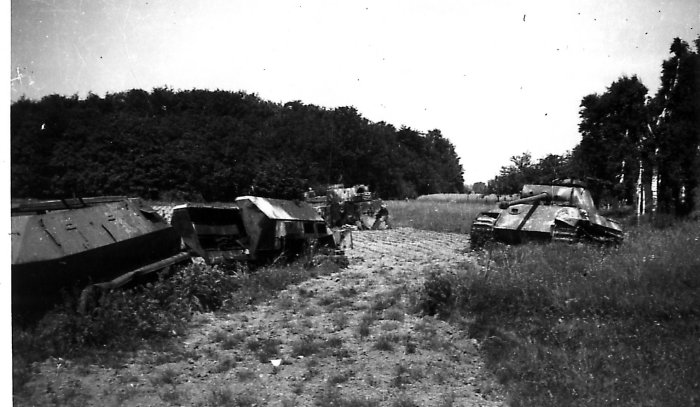 |
| Schulze's Panther and halftracks, abandoned in combat |
Now down to four Tigers and Major Schulze's Panther, which bore a red "S" for identification, the group launched a final attack towards Bückeburg on the 11th. At first, luck was not with the Kampfgruppe: two of the Tigers became stuck in muddy conditions and on both occasions Major Schulze tried to pull the immobilised tanks out with his Panther. The second time the Panther itself became stuck. While the crews destroyed their tanks, Major Schulze took command of "F05" - one of the two remaining Tigers. Together with the half-tracks they continued their attack. As the Kampfgruppe reached Achum they encountered US forces. One Tiger was destroyed, however the last commanded by Major Schulze knocked out three Shermans and a wheeled armoured vehicle (some sources say a armoured car, others a scout car).
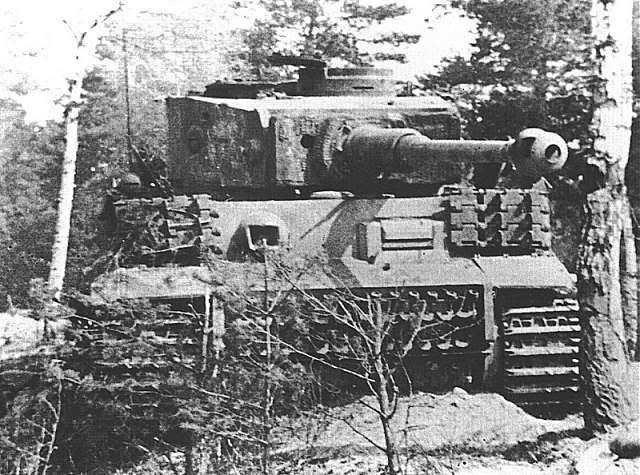 |
| Tiger I, similar to the one Schulze commanded |
Now alone, Major Schulze retreated towards Wendthagen where, finally with some luck his men captured a US fuel truck, which was used to refuel his Tiger. Looking through the cab Major Schulze found a map which he took. Next, they moved off towards Lauenau and then in the early hours of the 12th, F05 sneaked past the US occupied Nienstedt but shortly afterwards there was a flurry of combat. The exact details are hazy, but the result was a US Sherman being destroyed and 200 German POWs held in a barn being freed. The German POWs quickly sized two US trucks and began to follow F05 in an effort to escape. As the column neared Hohenbostel, Major Schulze noticed on the map that it marked the location of a US Headquarters. He decided to attack it. However as he manoeuvred to get into a position overlooking the US HQ, F05 finally ran out of fuel. Major Schulze quickly set a demolition charge and escaped back to German lines before being captured by US forces at the war’s end.
After the war he became a businessman, and then entered local politics serving on FDP council in Brakel. In 1957 he resigned from the council after a major disagreement. Schulze was asking about a sum of money owed to him as part of the award of his Knights Cross with Oak Leaves; the award of 1000DM had been previously promised to him by the local council after the Nazi government was unable to pay. Schulze wanted the award in part to show younger generations that military service was appreciated. When his request was rejected, Schulze took the only course open to him and distanced himself from the council. After this, and his remarkable acts of bravery and leadership during the Second World War, Major Paul Schulze largely disappeared from the pages of history.
By David ‘Listy’ Lister and Rick ‘JoJohnson’ Johnson
